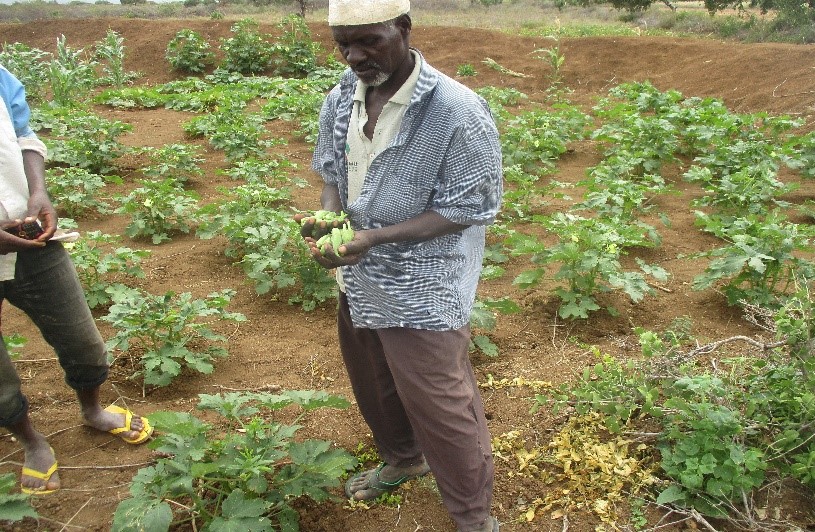Up to 2.1 million people across Somalia are expected to face food consumption gaps and high acute malnutrition. Current high levels of food insecurity are driven by drought conditions spanning over four consecutive poor rainy seasons, exacerbated by below-average and erratically distributed rainfall during the 2019 Gu season (April-June), which began late and finished early. In Bay region, more families continue to be displaced as the drought take toll on their remaining livestock and crops, forcing them to abandon their way of life.
The impact of climatic hazards on communities’ daily life
Abdullahi, 48 years old, has been living in Aw-basow village (Burhakaba district) for over 20 years now. He lives in the village with his wife and seven children. Before the drought struck, Abdullahi owned few goats for dairy subsistence and cultivated a rain-fed piece of land behind his homestead that grew some vegetables, beans and maize during the rainy season.
Like many other agro-pastoral communities in his village, Abdullahi’s expected cereals harvest failed. The goats were too weak to provide milk, leaving him unable to meet his family food needs. Life became unbearable and his ability to support his family thinned by the day as there were no other opportunities available. During this time, Abdullahi accumulated large debts as he was struggling to feed his family and rescue the remaining goats.
Cash-for-work and seeds distributions to support drought-affected families
In an effort to improve food security, livelihoods and build community resilience against recurrent droughts, ACTED, supported by the European Commission’s Directorate-General for European Civil Protection and Humanitarian Aid Operations (DG ECHO), implemented cash-for-work activities and seeds distributions. These activities allow beneficiaries to afford their family’s basic needs such as food, water and clothing, and also to grow drought-resistant vegetables.
ACTED is rehabilitating ten water pans through cash-for-work activities. This will increase access to water and create employment opportunities for the community. Abdullahi’s family is among 1,000 households that ACTED is supporting through its cash-for-work programme which acts as a safety net for families to attain self-reliance.
For four months, Abdullahi was enrolled in the cash–for-work programme, which provides beneficiaries with short-term employment. Through the programme, Abdullahi worked in the rehabilitation of water pans in his village, thus contributing to restoring key community assets and infrastructures. Abdullahi used much of the cash he received to buy food for his family and repay part of his debts.
Abdullahi was also trained on multi-storey garden practices. Multi-Sorey gardens is an innovative farming technique using bag gardens, reputable for utilizing minimal land and water. The idea is simple and has high efficiency in water use, which makes it ideal for water stressed locations like south-west Somalia.
He used the drought-resistant seeds he received from ACTED to grow vegetables in his garden just behind his homestead. He saved every drop of water and reused it in watering his farm. He would spend better part of the day in the garden to keep away rodents and insects from invading it. His hardwork paid, and he started harvesting zorzi, a locally consumed green vegetable which is enough to sustain his family for now.

With the garden, I feel that my family is healthier, happier and I don’t worry about them being hungry. In the past, I had to buy vegetables, but now I don’t need to do that since I am growing zorzi in my own garden. I’d like to become a model gardener for my village and teach people how to grow vegetables. People come to see the garden and want to buy my product. I saved and reused every drop of water in my house to water the garden and It was growing fast by the day
The project supplemented Abdullahi’s family food needs and provided a highly needed balanced diet with the nutritious zorzi. Most importantly, the cash he received was much more useful than food assistance, because it gave him the freedom to prioritize, as he knows best their most pressing needs for his family.